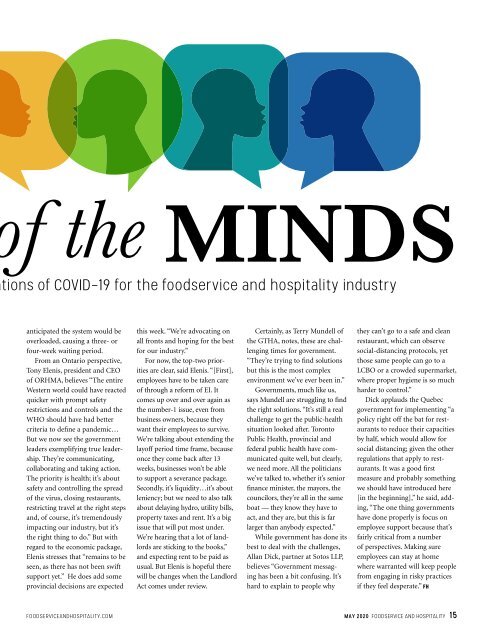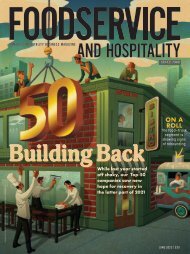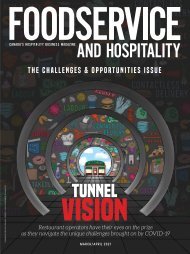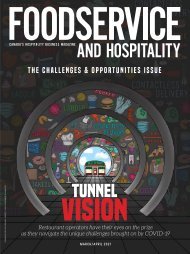May 2020
May 2020 issue of Foodservice and Hospitality magazine.
May 2020 issue of Foodservice and Hospitality magazine.
Create successful ePaper yourself
Turn your PDF publications into a flip-book with our unique Google optimized e-Paper software.
f the MINDS<br />
tions of COVID-19 for the foodservice and hospitality industry<br />
anticipated the system would be<br />
overloaded, causing a three- or<br />
four-week waiting period.<br />
From an Ontario perspective,<br />
Tony Elenis, president and CEO<br />
of ORHMA, believes “The entire<br />
Western world could have reacted<br />
quicker with prompt safety<br />
restrictions and controls and the<br />
WHO should have had better<br />
criteria to define a pandemic…<br />
But we now see the government<br />
leaders exemplifying true leadership.<br />
They’re communicating,<br />
collaborating and taking action.<br />
The priority is health; it’s about<br />
safety and controlling the spread<br />
of the virus, closing restaurants,<br />
restricting travel at the right steps<br />
and, of course, it’s tremendously<br />
impacting our industry, but it’s<br />
the right thing to do.” But with<br />
regard to the economic package,<br />
Elenis stresses that “remains to be<br />
seen, as there has not been swift<br />
support yet.” He does add some<br />
provincial decisions are expected<br />
this week. “We’re advocating on<br />
all fronts and hoping for the best<br />
for our industry.”<br />
For now, the top-two priorities<br />
are clear, said Elenis. “[First],<br />
employees have to be taken care<br />
of through a reform of EI. It<br />
comes up over and over again as<br />
the number-1 issue, even from<br />
business owners, because they<br />
want their employees to survive.<br />
We’re talking about extending the<br />
layoff period time frame, because<br />
once they come back after 13<br />
weeks, businesses won’t be able<br />
to support a severance package.<br />
Secondly, it’s liquidity…it’s about<br />
leniency; but we need to also talk<br />
about delaying hydro, utility bills,<br />
property taxes and rent. It’s a big<br />
issue that will put most under.<br />
We’re hearing that a lot of landlords<br />
are sticking to the books,”<br />
and expecting rent to be paid as<br />
usual. But Elenis is hopeful there<br />
will be changes when the Landlord<br />
Act comes under review.<br />
Certainly, as Terry Mundell of<br />
the GTHA, notes, these are challenging<br />
times for government.<br />
“They’re trying to find solutions<br />
but this is the most complex<br />
environment we’ve ever been in.”<br />
Governments, much like us,<br />
says Mundell are struggling to find<br />
the right solutions. “It’s still a real<br />
challenge to get the public-health<br />
situation looked after. Toronto<br />
Public Health, provincial and<br />
federal public health have communicated<br />
quite well, but clearly,<br />
we need more. All the politicians<br />
we’ve talked to, whether it’s senior<br />
finance minister, the mayors, the<br />
councilors, they’re all in the same<br />
boat — they know they have to<br />
act, and they are, but this is far<br />
larger than anybody expected.”<br />
While government has done its<br />
best to deal with the challenges,<br />
Allan Dick, partner at Sotos LLP,<br />
believes “Government messaging<br />
has been a bit confusing. It’s<br />
hard to explain to people why<br />
they can’t go to a safe and clean<br />
restaurant, which can observe<br />
social-distancing protocols, yet<br />
those same people can go to a<br />
LCBO or a crowded supermarket,<br />
where proper hygiene is so much<br />
harder to control.”<br />
Dick applauds the Quebec<br />
government for implementing “a<br />
policy right off the bat for restaurants<br />
to reduce their capacities<br />
by half, which would allow for<br />
social distancing; given the other<br />
regulations that apply to restaurants.<br />
It was a good first<br />
measure and probably something<br />
we should have introduced here<br />
[in the beginning],” he said, adding,<br />
“The one thing governments<br />
have done properly is focus on<br />
employee support because that’s<br />
fairly critical from a number<br />
of perspectives. Making sure<br />
employees can stay at home<br />
where warranted will keep people<br />
from engaging in risky practices<br />
if they feel desperate.” FH<br />
FOODSERVICEANDHOSPITALITY.COM<br />
MAY <strong>2020</strong> FOODSERVICE AND HOSPITALITY 15


















